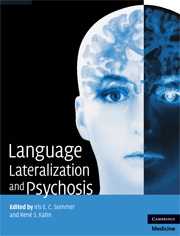Book contents
- Language Lateralization and Psychosis
- Language Lateralization and Psychosis
- Copyright page
- Contents
- Contributors
- Preface
- Section 1 Asymmetry, handedness and language lateralization
- 1 Molecular mechanisms establishing consistent left–right asymmetry during vertebrate embryogenesis
- 2 Cerebral lateralization in animal species
- 3 The history and geography of human handedness
- 4 The association between hand preference and language lateralization
- 5 The genetic basis of lateralization
- 6 Language lateralization and handedness in twins; an argument against a genetic basis?
- 7 Sex differences in handedness and language lateralization
- Section 2 Language lateralization and psychosis
- Index
5 - The genetic basis of lateralization
from Section 1 - Asymmetry, handedness and language lateralization
Published online by Cambridge University Press: 10 December 2009
- Language Lateralization and Psychosis
- Language Lateralization and Psychosis
- Copyright page
- Contents
- Contributors
- Preface
- Section 1 Asymmetry, handedness and language lateralization
- 1 Molecular mechanisms establishing consistent left–right asymmetry during vertebrate embryogenesis
- 2 Cerebral lateralization in animal species
- 3 The history and geography of human handedness
- 4 The association between hand preference and language lateralization
- 5 The genetic basis of lateralization
- 6 Language lateralization and handedness in twins; an argument against a genetic basis?
- 7 Sex differences in handedness and language lateralization
- Section 2 Language lateralization and psychosis
- Index
Summary
- Type
- Chapter
- Information
- Language Lateralization and Psychosis , pp. 73 - 86Publisher: Cambridge University PressPrint publication year: 2009
- 4
- Cited by



